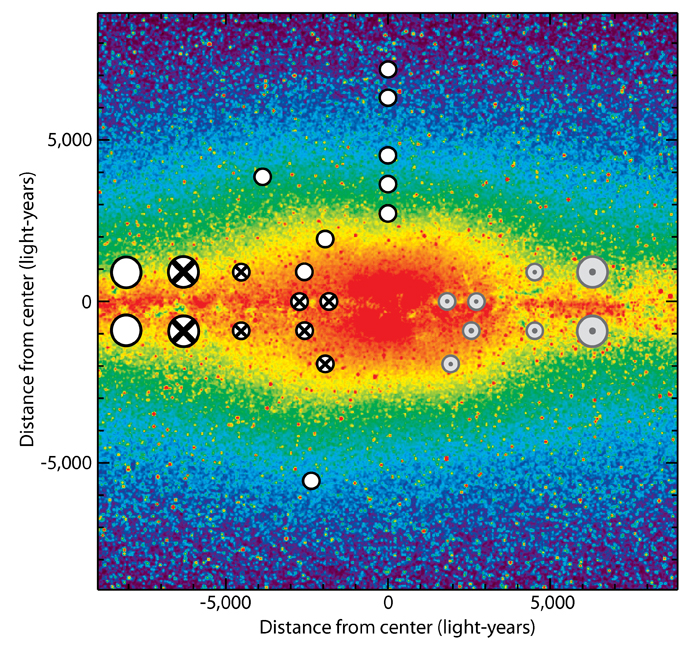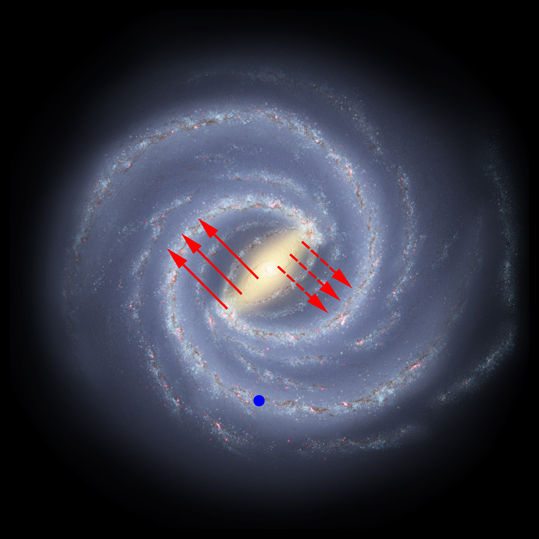Forget the restaurant at the end of the Universe — astronomers now have the clearest understanding yet of the bar at the center of the Milky Way. Scientists with the Sloan Digital Sky Survey III (SDSS-III) have announced the discovery of hundreds of stars rapidly moving together in long, looping orbits around the center of our Galaxy.
“The best explanation for their orbits is that these stars are part of the Milky Way bar,” says David Nidever, a Dean B. McLaughin Fellow in the Astronomy Department at the University of Michigan. “We know that the bar plays an important role in determining the structure of the Galaxy, so learning more about these stars will help us understand the whole Galaxy, even out here in the spiral arms.”
Illustration Credit: David Nidever (University of Michigan / University of Virginia) and the SDSS-III Collaboration. Background image from the Two-Micron All Sky Survey Image Mosaic (Infrared Processing and Analysis Center/Caltech & University of Massachusetts).
The team’s discovery came from accurately measuring the speeds of thousands of stars near the center of the Milky Way. The center of our Galaxy is 30,000 light-years away — close by cosmic standards — yet we know surprisingly little about it, because the Galaxy’s dusty disk hides it from view. In spite of this blind spot, though, we do know a key fact about our Galaxy: like many spiral galaxies, the Milky Way has a ‘bar’ of stars that orbit together around the Galactic Center.
“We know of the bar’s existence from many separate lines of evidence,” says Gail Zasowski, a National Science Foundation postdoctoral Fellow at The Ohio State University. “What we don’t know is which stars are part of the bar, and what the velocities of those stars are. That information will help us understand how the bar formed, and how its stars relate to the stars in the rest of the Galaxy.”
Gail Zasowski
The trouble is that there is no obvious way to tell a star in the Milky Way’s bar apart from any other star in the same neighborhood. Instead, the key to finding bar stars is to measure the velocities of many stars, then see whether some of those stars are moving together in some unusual pattern. Although interstellar dust blocks nearly all visible light, longer infrared wavelengths can partially shine through. So a survey of stellar positions and velocities that operates in infrared light could finally pierce the veil of dust, and collect data from enough stars in the innermost Milky Way to firmly identify which ones are part of the bar.
Enter SDSS-III’s new Apache Point Galactic Evolution Experiment (APOGEE). APOGEE uses a custom-built high-resolution infrared spectrograph attached to the 2.5-meter Sloan Foundation Telescope in New Mexico, and is capable of measuring the velocities and chemical compositions of up to 300 stars at once. “What separates APOGEE from previous spectroscopic surveys is that we are studying the Galaxy using infrared light,” Nidever says. APOGEE began observations in June 2011 and has already observed more than 48,000 stars all over our galaxy.
Credit: Jordan Raddick (Johns Hopkins University) and Gail Zasowski (The Ohio State University / University of Virginia). Milky Way artist’s concept by NASA/JPL-Caltech/R. Hurt (SSC-Caltech).
In a paper published recently in the Astrophysical Journal, a worldwide team of scientists including Nidever and Zasowski used data from the first few months of APOGEE observations to measure the velocities for nearly 5,000 stars near the Galactic center. With these velocity measurements, they assembled a picture of how these stars orbit the center of the Milky Way. However, quite unexpectedly, they found that a substantial fraction of stars in the inner Galaxy are moving away from us quickly — about 10 percent of the total stars in their sample are moving at more than 200 kilometers per second (400,000 miles per hour) away from the Earth. The observed pattern of these fast stars is similar in many different parts of the inner Galaxy, and is the same above and below the midplane of the Galaxy — suggesting that these measurements of fast central stars are not just a statistical fluke, but really are a feature of our Galaxy.
The team then compared their observations with the predictions of the bar stars from the latest computer models of the Galaxy — and the observations matched the predictions closely. “Based on the evidence from the model comparisons, I am now confident that these fast-moving stars are part of the bar,” Nidever says. “I was actually quite surprised that they showed up so clearly in our survey.
Contacts
- David Nidever, University of Michigan, dnidever -at- umich.edu, 734-615-6141
- Gail Zasowski, The Ohio State University, gail.zasowski -at- gmail.com, 614-292-6925
- Steven Majewski, University of Virginia, srm4n -at- virginia.edu, 434-924-4893
- Michael Wood-Vasey, SDSS-III Spokesperson, University of Pittsburgh, wmwv -at- pitt.edu, 412-624-2751
- Jordan Raddick, SDSS Public Information Officer, raddick -at- jhu.edu, 410-516-8889
APOGEE’s identification of which stars are part of the bar will allow astronomers to study how stars in the bar and in the rest of the galaxy react to one another. “The bar acts like a giant mixer for our galaxy,” says Steven Majewski, a professor of astronomy at the University of Virginia and the principal investigator for the APOGEE project. “As the bar rotates, it churns up the motions of nearby stars. Over time, this mixing should have a large effect on the disk of our galaxy, including in spiral arms where we live, but this effect is not well understood. This new sample of definitively-identified bar stars gives us a unique opportunity to learn more about exactly how this giant blender mixes up our galaxy.”
But the team’s discovery only tells half the story. So far, APOGEE has only observed one side of the bar, the side where the stars are moving away from the Earth. On the other side, the stars must be moving toward Earth. But unfortunately, the Sloan telescope is inconveniently placed: the other half of the Milky Way bar is visible only from Earth’s southern hemisphere. Seeing the other side of the bar is one of the motivations for a planned fourth generation of the Sloan Digital Sky Survey. Part of this successor project will implement the same techniques using a 2.5-meter telescope in Chile to observe the rest of the inner Milky Way. The new survey is set to begin in 2014.
Images
Illustration Credit: David Nidever (University of Michigan / University of Virginia) and the SDSS-III Collaboration. Background image from the Two-Micron All Sky Survey Image Mosaic (Infrared Processing and Analysis Center/Caltech & University of Massachusetts).
Credit: Jordan Raddick (Johns Hopkins University) and Gail Zasowski (The Ohio State University / University of Virginia). Milky Way artist’s concept by NASA/JPL-Caltech/R. Hurt (SSC-Caltech).
Paper announcing the results
D.L. Nidever, G. Zasowski, S.R. Majewski, J. Bird, A.C. Robin, I. Martinez-Valpuesta, R.L. Beaton, R. Schönrich, Ralph; M. Schultheis, J.C. Wilson, M.F. Skrutskie, R.W. O’Connell, M. Shetrone, R.P. Schiavon, J.A. Johnson, B. Weiner, O. Gerhard, D.P. Schneider, C. Allende Prieto, K. Sellgren, D. Bizyaev, H. Brewington, J. Brinkmann, D.J. Eisenstein, P.M. Frinchaboy, A.E. García Pérez, J. Holtzman, F.R. Hearty, E. Malanushenko, V. Malanushenko, D. Muna, D. Oravetz, K. Pan, A. Simmons, S. Snedden, and B.A. Weaver, 2012, The Apache Point Observatory Galactic Evolution Experiment: First Detection of High-velocity Milky Way Bar Stars, Astrophysical Journal Letters, 755(2), L25, doi:10.1088/2041-8205/755/2/L25.
About the Sloan Digital Sky Survey
Funding for SDSS-III has been provided by the Alfred P. Sloan Foundation, the Participating Institutions, the National Science Foundation, and the U.S. Department of Energy Office of Science. The SDSS-III web site is www.sdss3.org .
SDSS-III is managed by the Astrophysical Research Consortium for the Participating Institutions of the SDSS‑III Collaboration including the University of Arizona, the Brazilian Participation Group, Brookhaven National Laboratory, Carnegie Mellon University, University of Florida, the French Participation Group, the German Participation Group, Harvard University, the Instituto de Astrofisica de Canarias, the Michigan State/Notre Dame/JINA Participation Group, Johns Hopkins University, Lawrence Berkeley National Laboratory, Max Planck Institute for Astrophysics, Max Planck Institute for Extraterrestrial Physics, New Mexico State University, New York University, The Ohio State University, Pennsylvania State University, University of Portsmouth, Princeton University, the Spanish Participation Group, University of Tokyo, University of Utah, Vanderbilt University, University of Virginia, University of Washington, and Yale University.





